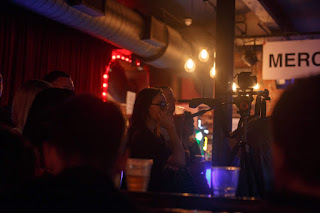Five Steps to Getting Your Foot in the Door
Hi everyone,
I get asked a lot for tips on networking and how I would recommend new entrants get their foot in the door. A feat that’s definitely a lot harder these days with Lockdown requiring any masterclasses, workshops or networking events to go online.
Based off of my own experience, I’ve put together this five-step networking guide for anyone who could use it, and included a little Covid Adaptation to the steps that need one so you don’t have to wait for restrictions to ease before you get started.
1. Show Up
If you follow NI Screen, Royal Television Society NI, RTS Futures NI, Women in Film & TV NI, and Media Therapy on Twitter or Facebook, you’ll see that there are, in fact, loads of opportunities to meet people and expand your network.
These organisations put on and promote all kinds of workshops and masterclasses in the NI Film and TV sector. Whilst you may need to buy tickets for some of them, most of them (and all the ones I would go to) are free.
Here’s a list of their socials to follow so you can make sure you’re at their next event!
Organisation | Facebook Link | Twitter Handle |
NI Screen | @NIScreen | |
Royal Television Society NI | @RTS_NI | |
RTS Futures NI | @RTSFutures_NI | |
Women in Film & TV NI | @WFTV_UK | |
Media Therapy | @MediaTherapy |
🦠😷 Covid Adaptation 😷🦠
Not meaning to state the obvious, but Lockdown’s 1 - ∞ outlawed any physical, real-life gatherings, including Film & TV masterclasses and events happening in venues that you actually have to leave your house to get to.
BUT a lot of the organisations I listed have been hosting events online; WFTV NI, RTSNI, and RTS Futures NI have been hosting loads of great events since last March, and you should follow Media Therapy so you’re the first to know when their physical industry meet-ups start again!
2. Chat
It’s not enough to just show up, sit in the back, and leave immediately without asking any questions.
These events nearly always have a Q&A portion towards the end, and the best way to get noticed by the industry speaker is to ask a question. Not only does it get them to notice you, but it also shows that you’re actively engaging with what they were saying.
If you’re nervous to speak in front of the rest of the audience, sit in the front. That way, you can’t see the rest of the crowd, and it feels like there’re less eyes on you.
Arguably, the most vital part of the chat step is to hang around afterwards and actually make a point of chatting to people you don’t know.
If the speaker doesn’t bolt from the event the second it’s over, there’s usually a sort of queue that forms around them of other attendees who want to network with them, join that queue. Odds are, you’ll see them again at another event, and it’s always great to be able to say ‘Hi, you probably don’t remember me, but we met at _____’ etc.
RTS Futures NI’s events are mainly geared toward other new entrants, so you should definitely chat to attendees to make some friends who're at the same level as you, you’ve no idea where they’re gonna end up and how often you’re gonna see them about.
WFTV, RTSNI and Media Therapy events/meetups are geared more towards professionals (although new entrants are totally welcome) This is where I would tell you to definitely make a point of initiating awkward chit-chat with the other attendees.
This is exactly how I met my unofficial mentor Sarah McCaffrey (Commercial, Rights & Business Affairs Exec at BBC Children’s), who has very kindly looked out for me, given amazing advice and recommended me for jobs (including the one I’m currently in) ever since.
I met her because she attended the second or third industry event I rocked up to (the Women in Film & TV Northern Ireland launch). I was handing out my Media-Tailored CV to whoever would take it and chatting the ear off of everyone about how much I wanted to work in TV and just needed to get started. Sarah gave me my first ever runner job on BBC Digital Cities Belfast shortly after. All because I had showed up, and been enthusiastic that day.
I really believe that if I hadn’t bothered to go or just skulked home immediately after the panel chat ended, I wouldn’t have the career I do today because I wouldn't have met Sarah and had her guidance throughout the entirety of my (then non-existent) career.
I always tell people to go to these events to network because you really have no idea what kind of positive domino effect you could start!
🦠😷 Covid Adaptation 😷🦠
Due to aforementioned Lockdowns 1 - ∞, all of these events are now zoom-based. This may take away the opportunity to chat to other attendees, but not to ask questions and get the attention of the speaker during the Q&A part of a zoom event!
I know that this limits your networking pool, but we won’t be in lockdown forever, and if the only person you get to chat to for 30 seconds is the speaker, that’s still a step further than you were before, don’t wait for the world to open up!
3. Tweet
Now that you’ve shown up and chatted/got yourself noticed, you need to follow up by engaging with the event/person on social media.
Twitter is the platform of choice for most of the established people in media, so what you should do is tweet about attending/watching the event, and be sure to tag the organisation/ speaker on twitter (and follow them too, there’s a good chance they’ll follow back!)
The purpose this serves is to reinforce yourself to the speaker, social media is a great tool that I’ve used several times to let people know what I'm up to/remind them I exist.
If you make a point of going to/watching these kind of industry events often, it’s a great excuse to tweet, and get yourself at the top of any industry mutuals’ (you both follow each other) social media feeds. The more often people remember you exist, the better the chance they’ll think of you when a runner job/experience opportunity comes up!
🦠😷 Covid Adaptation 😷🦠
There isn’t one! Socials are still up and running and, if anything, people are sat on their phones more than ever, so create your professional (I really can’t stress ‘professional’ enough!) Twitter account and start following and tagging!
4. Follow Up
Showing up, chatting and tweeting unfortunately aren’t enough to get you that first (or second, or 40th) reliable contact you’re looking for.
You need to follow up and stay in contact with these new people. They’re way more likely to think of you when they need a runner/trainee at the last second if you keep in touch, than if you had just chatted and tagged them on twitter once.
The whole reason I created this blog was to give myself an excuse to pop up at the top of people’s social media feeds, as well as email them regularly with a direct link to my latest blog update, and at the end of those emails, I could ask them (for the thousandth time) if they’d heard of any trainee/runner gigs going and make sure my most up to date CV was attached.
I recommend you also find an excuse to pop up to people via email/socials regularly. Whether you start a blog, podcast, YouTube channel, or even if you manage to secure a gig elsewhere you should make sure to keep them updated, show off your skill set (everyone knows I can write, use socials well and film/edit videos now) and keep your name fresh in their mind!
🦠😷 Covid Adaptation 😷🦠
Step 4 doesn’t need a covid adaptation either, all you have to do is keep tagging, direct messaging, and reaching out to your contacts on any platform you can
5. Be Consistent
This is definitely the most important step when it comes to successful networking. You could perform the first 4 steps flawlessly the first time and still not have a job offer come of it, which is why you need to repeat the process over and over again until it does.
When I was first starting out, I always told myself to aim for 100 rejections, because that means 100 attempts and 100 applications.
Having this mindset makes you feel a lot more positive about the inevitable batch of rejections you’ll get, and (in my experience) everyone I know has always achieved their goal before they reach that 100th attempt.
Aiming for 100 rejections is something I still do when I’m between gigs and looking for my next job.
Having the ‘100 rejections’ mindset has always helped me to stay motivated and positive, it helps me maintain the mindset that every rejection just takes me one step closer to my goal.
Again, this is all totally based off of my own experience, and this is the advice I always give to new entrants when asked. I really hope this is useful to anyone who just needed to know where or how to start!
If getting your foot in the door in the Film & TV sector was easy, everyone would do it
Stacey X





Comments
Post a Comment